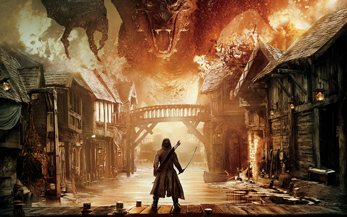|
|
Movie Review - The Hobbit: The Battle of the Five ArmiesBy Matthew HuntleyDecember 22, 2014
If you’re familiar with the book and/or the first two films, then you know about the journey of Bilbo Baggins (Martin Freeman), the titular character, and the Dwarf clan with whom he’s traveled throughout Middle Earth to reclaim Lonely Mountain, a central of hub of power in the land that has long been occupied by Smaug, a fire-breathing dragon. At the end of the last film, Smaug sprang from the once-opulent mountain kingdom to wreak havoc on Laketown, a Man-occupied village. At the beginning of “Battle,” he flies overhead, killing men, women and children. Luckily, Bard (Luke Evans) manages to slay Smaug, but the dragon’s death only ignites a war among the five main groups of Middle Earth - Men, Dwarves, Elves, Orcs and Giant Eagles—as each now lays claim to Lonely Mountain and its strategic location, not to mention its mounds of gold. To the leaders of these groups - among them Thorin (Richard Armitage), who heads the Dwarves, and Thranduil (Lee Pace), the Elvenking - controlling Lonely Mountain means controlling Middle Earth. All the while, Bilbo continues to hide the Arkenstone from Thorin. This is the gem the Dwarves consider “the Heart of the Mountain,” which yields its owner the right to rule. Bilbo rightly presumes that handing it over to Thorin would drive him mad. Gandalf (Ian McKellen), meanwhile, pleads to each of the commanders that war between Men, Dwarves and Elves is petty compared to the greater threat from the oncoming Orcs. How The Battle of the Five Armies plays out, both as an adventure tale and moral fable, will surprise no one, but just like Jackson’s Lord of the Rings trilogy, these movies have always put spectacle before narrative. This is a shame since we’d prefer such a grand and full-scale epic to bear more emotional resonance, but even when it tries, it falls flat. We see this mostly with the laughable love triangle that forms between Tauriel (Evangeline Lilly), Legolas (Orlando Bloom), and Kili (Aidan Turner). Tauriel and Legolas are both elves, while Kili is a dwarf, and the ensuing conflict and dialogue are so cheesy they almost make the movie a parody Nevertheless, The Battle of the Five Armies is more enjoyable than not, although it leaves us thinking the great Hobbit adaptation remains to be made. Even if it was always meant to be a children’s fantasy, the filmmakers gradually lost sight of the heart of the story and the connection we’re supposed to have with Bilbo and company. An Unexpected Journey started things off right, but then The Desolation of Smaug got bogged down with too many characters and special effects that we stopped caring about what happens. “Battle” regains some of that lost focus and does allow the series to end on a high note, but it’s not as high as we would have preferred.
|

|
|
|

|
Thursday, October 31, 2024
© 2024 Box Office Prophets, a division of One Of Us, Inc.


